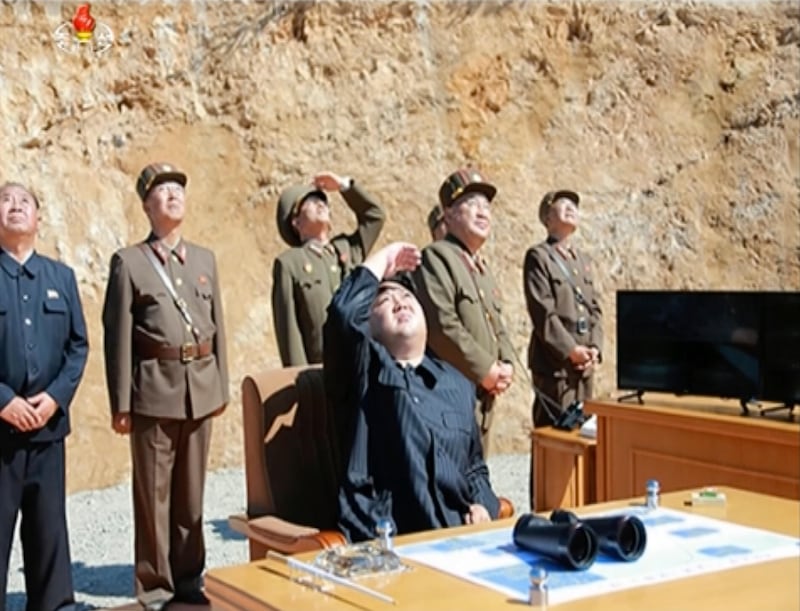SEOUL // Grinning broadly, North Korean leader Kim Jong-un delighted in the global furor created by his nation's first launch of an intercontinental ballistic missile, vowing on Wednesday to never abandon nuclear weapons and to keep sending Washington more "gift packages" of missile and atomic tests.
US and South Korean forces, in response to Tuesday's launch, engineered a show of force for Pyongyang, with soldiers from the allies firing "deep strike" precision missiles into South Korean territorial waters. South Korean president Moon Jae-in ordered the drills arranged with the US to show "North Korea our firm combined missile response posture", his office said.
A North Korean test of an ICBM, confirmed later by US and South Korean officials, is a momentous step forward for Pyongyang as it works to build an arsenal of long-range nuclear-armed missiles that can hit anywhere in the US. The North is not there yet - some analysts suggest it will take several more ears to perfect such an arsenal, but a successful launch of an ICBM has long been seen as a red line, after which it would only be a matter of time if the country is not stopped.
Worry spread in Washington and at the United Nations, where the US, Japan and South Korea requested a UN Security Council emergency session to be held later on Wednesday. US Secretary of State Rex Tillerson said the US response would include "stronger measures to hold the DPRK accountable", using an acronym for the nation's formal name, the Democratic People's Republic of Korea.
The uproar only seemed to inspire the North, whose propaganda machine rarely fails to aggrandise its leader and its military or to thumb its nose at rivals Seoul and Washington.
A report in its state media on Wednesday described Mr Kim as "feasting his eyes" on the ICBM, which was said to be capable of carrying a large nuclear warhead, before its launch. "With a broad smile on his face," Mr Kim urged his scientists to "frequently send big and small 'gift packages' to the Yankees" an apparent reference to continuing the stream of nuclear and missile tests Kim has ordered since taking power in late 2011.
The North was also pleased that its test came as Americans celebrated Independence Day.
Mr Kim, the state media report said, told "scientists and technicians that the US would be displeased to witness the DPRK's strategic option as it was given a 'package of gifts' incurring its disfavour by the DPRK on its 'Independence Day'." The North has a history of conducting weapons test on or around July 4.
Mr Kim reportedly "stressed that the protracted showdown with the US imperialists has reached its final phase and it is the time for the DPRK to demonstrate its mettle to the US, which is testing its will in defiance of its warning".
The test, North Korea's most successful yet, is a direct rebuke to US president Donald Trump's earlier declaration that such a test "won't happen!"
A US scientist analysing the height and distance of the launch said the missile could potentially reach Alaska.
North Korea's Academy of Defence Science, in a bit of hyperbole, said the test of what it called the Hwasong-14 marked the "final step" in creating a "confident and powerful nuclear state that can strike anywhere on Earth".
South Korea's defence ministry, in a report to lawmakers, tentatively concluded that North Korea test-fired a "new missile with an ICBM-class range" of more than 5,500 kilometres. But the ministry said it's not certain if the test was successful because Seoul could not verify if the North has mastered re-entry technology for an ICBM. The ministry said North Korea may now conduct a nuclear test with "boosted explosive power" to show off a warhead to be mounted on a missile.
The launch sends a political warning to Washington and its chief Asian allies, Seoul and Tokyo, while also allowing North Korean scientists a chance to perfect their still-incomplete nuclear missile programme. It came days after the first face-to-face meeting between Mr Trump and Mr Moon and ahead of a summit of the world's richest economies.





